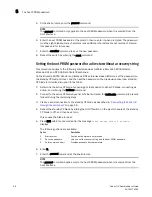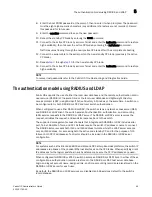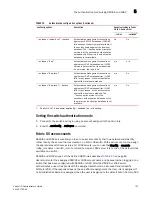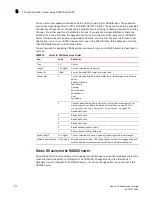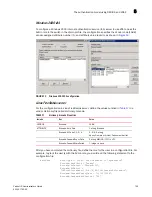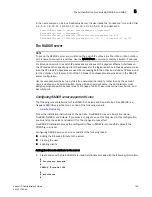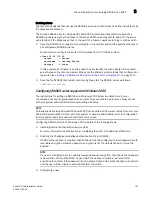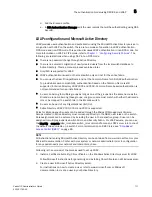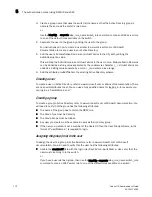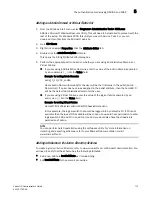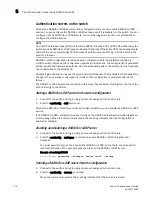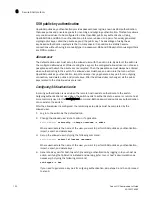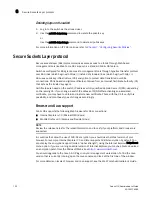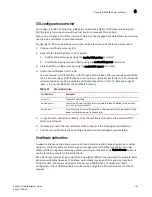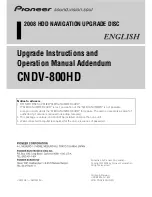
112
Fabric OS Administrator’s Guide
53-1001763-02
The authentication model using RADIUS and LDAP
5
3. Create a group name that uses the switch’s role name so that the Active Directory group’s
name is the same as the switch’s role name.
or
Use the ldapCfg
-–
maprole
ldap_role_name switch_role
command to map an LDAP server role
to one of the default roles available on the switch.
4. Associate the user to the group by adding the user to the group.
For instructions on how to create a user refer to www.microsoft.com or Microsoft
documentation to create a user in your Active Directory.
5. Add the user’s Administrative Domains or Virtual Fabrics to the CN_list by editing the
adminDescription
value.
This will map the Admin Domains or Virtual Fabrics to the user name. Multiple Admin Domains
can be added as a string value separated by the underscore character ( _ ). Virtual Fabrics are
added as a string value separate by a colon ( , ) and entered as a range.
6. Add the attribute
brcdAdVfData
to the existing Active Directory schema.
Creating a user
To create a user in Active Directory, refer to www.microsoft.com or Microsoft documentation. There
are no special attributes to set. You can use a fully qualified name for logging in, for example you
can log in as "[email protected]".
Creating a group
To create a group in Active Directory, refer to www.microsoft.com or Microsoft documentation. You
will need to verify that the group has the following attributes:
•
The name of the group has to match the RBAC role.
•
The Group Type must be
Security
.
•
The Group Scope must be
Global
.
•
Any user you create must have domain users as their primary group.
•
If the user you created is not a member of the Users OU then the User Principal Name, in the
format of "user@domain", is required to login.
Assigning the group (role) to the user
To assign the user to a group in Active Directory, refer to www.microsoft.com or Microsoft
documentation. You will need to verify that the user has the following attributes:
•
Update the memberOf field with the login role (Root, Admin, SwitchAdmin, User, etc.) that the
user must use to log in to the switch.
or
If you have a user-defined group, then use the ldapCfg -–maprole
ldap_role_name switch_role
command to map an LDAP server role to one of the default roles available on a switch.
Summary of Contents for 53-1001763-02
Page 1: ...53 1001763 02 13 September 2010 Fabric OS Administrator s Guide Supporting Fabric OS v6 4 0 ...
Page 4: ...iv Fabric OS Administrator s Guide 53 1001763 02 ...
Page 24: ...xxiv Fabric OS Administrator s Guide 53 1001763 02 ...
Page 28: ...xxviii Fabric OS Administrator s Guide 53 1001763 02 ...
Page 32: ...xxxii Fabric OS Administrator s Guide 53 1001763 02 ...
Page 40: ...xl Fabric OS Administrator s Guide 53 1001763 02 ...
Page 42: ...2 Fabric OS Administrator s Guide 53 1001763 02 ...
Page 54: ...14 Fabric OS Administrator s Guide 53 1001763 02 High availability of daemon processes 1 ...
Page 74: ...34 Fabric OS Administrator s Guide 53 1001763 02 Basic connections 2 ...
Page 102: ...62 Fabric OS Administrator s Guide 53 1001763 02 Audit log configuration 3 ...
Page 214: ...174 Fabric OS Administrator s Guide 53 1001763 02 Management interface security 7 ...
Page 228: ...188 Fabric OS Administrator s Guide 53 1001763 02 Brocade configuration form 8 ...
Page 276: ...236 Fabric OS Administrator s Guide 53 1001763 02 Creating a logical fabric using XISLs 10 ...
Page 404: ...364 Fabric OS Administrator s Guide 53 1001763 02 ...
Page 440: ...400 Fabric OS Administrator s Guide 53 1001763 02 Performance data collection 17 ...
Page 480: ...440 Fabric OS Administrator s Guide 53 1001763 02 F_Port masterless trunking 19 ...
Page 494: ...454 Fabric OS Administrator s Guide 53 1001763 02 Buffer credit recovery 20 ...
Page 574: ...534 Fabric OS Administrator s Guide 53 1001763 02 Hexadecimal overview E ...

